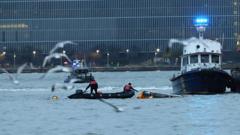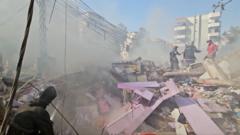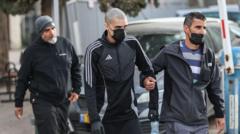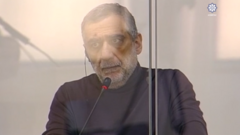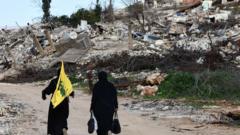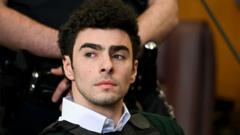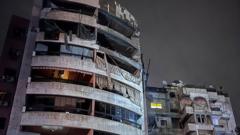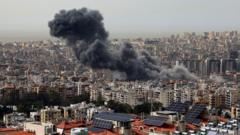The trial of Hadi Matar, a 27-year-old charged with attempted murder and assault, began in Mayville, New York. Matar, who maintains his innocence, allegedly attacked Rushdie during a lecture at the Chautauqua Institute, inflicting serious injuries, including damage that resulted in blindness in one eye for the author.
**Trial of Hadi Matar, Accused of Stabbing Salman Rushdie, Commences in New York**
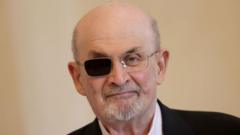
**Trial of Hadi Matar, Accused of Stabbing Salman Rushdie, Commences in New York**
A jury will soon deliberate the fate of the man charged with the 2022 attack on the acclaimed author Salman Rushdie, which left him with life-altering injuries.
In a case that highlights ongoing debates around free speech and the consequences of political violence, Mr Rushdie's life was turned upside down after the incident. Known for his controversial novel "The Satanic Verses," Rushdie has long been a target of threats stemming from his writing, particularly a fatwa issued against him by Iranian clerics following the book's publication in 1988.
The attack occurred as Rushdie was set to speak on the safety of exiled writers, an irony not lost on many. Witnesses reported a chaotic scene as Matar allegedly lunged at Rushdie, resulting in significant bloodshed and a swift police response. The incident reverberates beyond individual culpability; it raises questions about the cultural climate of hostility that can lead to violent actions based on ideological extremism.
The trial will feature testimonies from various witnesses, including Rushdie, who was airlifted to undergo urgent medical treatment and has since had to adapt to the physical and psychological ramifications of the attack. Matar’s background and the motivations driving his actions, including his previous praise for the Iranian fatwa, will likely be scrutinized.
Matar, originally from New Jersey with Lebanese heritage, had not articulated any clear motive at the time of his arrest, but he acknowledged being influenced by sentiments against Rushdie's writings. Additionally, separate charges in federal court allege Matar provided support to the militant group Hezbollah, complicating his legal standing.
As the trial unfolds, it reflects ongoing global tensions surrounding freedom of expression, cultural identity, and extremist ideologies. Rushdie's resilience, marked by his ability to return to public life and even publish a memoir titled "Knife," continues to inspire advocates for free speech.
With jury selection completed, the trial is poised to start, setting the stage for a critical examination of these pressing cultural issues trembling at the intersection of literature and the law.
Rushdie's return to the courtroom could serve as a poignant reminder of the ongoing struggle between artistic expression and radical opposition, continuing a dialogue that spans decades and borders.
The attack occurred as Rushdie was set to speak on the safety of exiled writers, an irony not lost on many. Witnesses reported a chaotic scene as Matar allegedly lunged at Rushdie, resulting in significant bloodshed and a swift police response. The incident reverberates beyond individual culpability; it raises questions about the cultural climate of hostility that can lead to violent actions based on ideological extremism.
The trial will feature testimonies from various witnesses, including Rushdie, who was airlifted to undergo urgent medical treatment and has since had to adapt to the physical and psychological ramifications of the attack. Matar’s background and the motivations driving his actions, including his previous praise for the Iranian fatwa, will likely be scrutinized.
Matar, originally from New Jersey with Lebanese heritage, had not articulated any clear motive at the time of his arrest, but he acknowledged being influenced by sentiments against Rushdie's writings. Additionally, separate charges in federal court allege Matar provided support to the militant group Hezbollah, complicating his legal standing.
As the trial unfolds, it reflects ongoing global tensions surrounding freedom of expression, cultural identity, and extremist ideologies. Rushdie's resilience, marked by his ability to return to public life and even publish a memoir titled "Knife," continues to inspire advocates for free speech.
With jury selection completed, the trial is poised to start, setting the stage for a critical examination of these pressing cultural issues trembling at the intersection of literature and the law.
Rushdie's return to the courtroom could serve as a poignant reminder of the ongoing struggle between artistic expression and radical opposition, continuing a dialogue that spans decades and borders.





